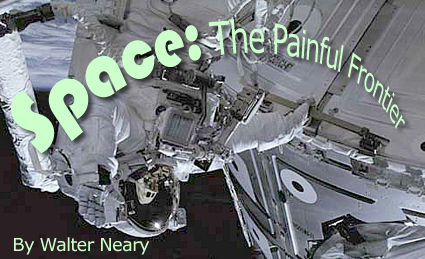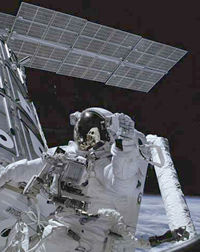 The Dangers of Space Include Bone Loss, Muscle Atrophy and Even Cancer. The UW Hopes to Protect the Next Generation of Astronauts and Bring About Earthly Cures.
The Dangers of Space Include Bone Loss, Muscle Atrophy and Even Cancer. The UW Hopes to Protect the Next Generation of Astronauts and Bring About Earthly Cures.
The one thing you could always say about Capt. James T. Kirk is that as soon as he arrived on a planet, he was ready to romance the nearest attractive alien.
There's a reason they call it science fiction.
The fact is, if he traveled under the conditions as we understand them today, Star Trek's Capt. Kirk would have trouble even getting a date. Imagine being on the welcoming committee when this guy arrives on your planet and immediately starts vomiting—as he falls over in front of you.
Even if Kirk gets a date, there wouldn't be much he could do. Heaven forbid they go dancing. Kirk would flop all over the dance floor, unable to keep his feet steady. The merest twist and turn could shatter his hip bone, left fragile by bone demineralization.
And any long-term relationship would have to take into account the fact that Kirk would likely be sterile and a terminal cancer patient—following months of bombardment from deadly radiation in space.

Astronaut James H. Newman waves at the camera during a seven-hour spacewalk to work on a space station module. Photo courtesy of NASA.
What's Kirk's problem? Each one of us has grown up with gravity shaping our form. Our body, for example, has grown a framework of muscles and bones to hold us up under constant downward force of gravity. If you remove this force during space travel, the body logically concludes that it should no longer spend nourishment on unneeded muscle and bone. It's estimated that astronauts on a mission to Mars would lose a fifth or more of their bone mass. So that's why Kirk would likely break some bones following a long trip.
Similarly, without any gravity, your muscles rightfully conclude they can ramp down. Astronauts return from long trips in space with muscles so atrophied that they cannot stand. Zero gravity also challenges one's sense of balance: nausea is a common problem.
People around the world dream of seeing someone step onto Mars in 15 to 20 years. Before anyone can do so—and live to tell about it—a lot of work needs to be done. That's the reason that NASA and other federal officials created the National Space Biomedical Research Institute, based at the Baylor College of Medicine in Houston. The University of Washington recently became one of the consortium's 12 members. Its goal is to prevent or cure the diseases of space, making discoveries that will benefit those of us left on Earth.
Go To: Page 1 | Page 2 | Page 3 | Page 4
- Sidebar: From Fiction to Fact: Space Station Alpha
- Return to March 2001 Table of Contents